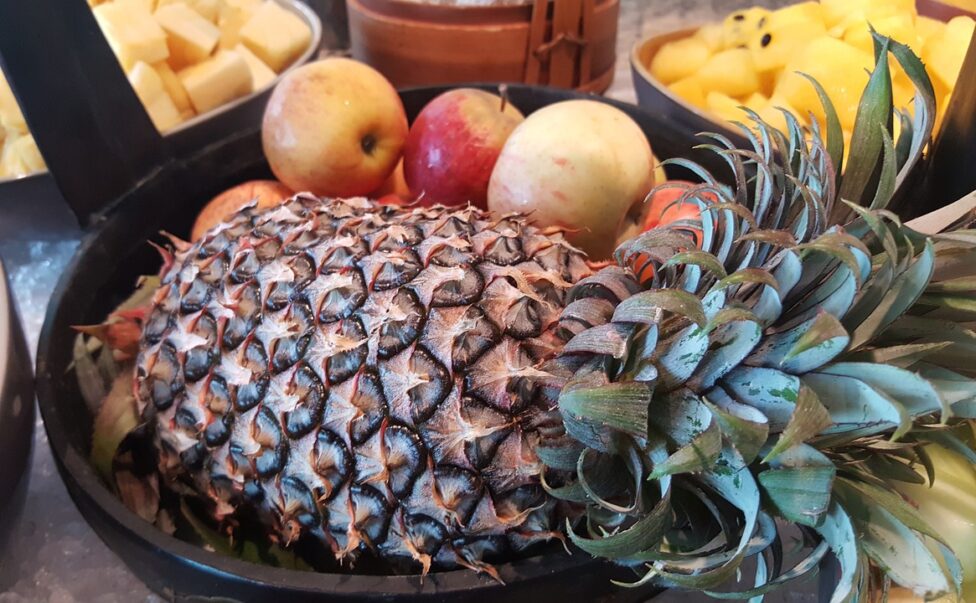Pineapple: Fruit or Not?
Pineapple is scientifically classified as a fruit, specifically a compound fruit. This means that it is made up of several small fruits that have fused together to form one larger fruit. Pineapple belongs to the family of bromeliads, which originated in South America. It is closely related to other tropical fruits such as guava, papaya, and mango.
Despite its clear classification as a fruit, pineapple has been debated by many as to whether it should be considered a fruit or a vegetable. This controversy arises from the fact that pineapple is often used in savory dishes, such as pizza and stir-fries. However, the scientific classification of pineapple as a fruit cannot be denied.
Another characteristic of pineapple that sets it apart from other fruits is its enzyme, bromelain. Bromelain is a protein-digesting enzyme that is found in the stem and core of the pineapple. This enzyme has been shown to have anti-inflammatory and digestive benefits, making pineapple a healthy addition to any diet.
Pineapple’s Classification
According to scientific classification, pineapple is considered a fruit, specifically a compound fruit. This means that it is made up of several small fruits that have fused together to form one larger fruit.
Named for its resemblance to a pinecone, the pineapple has a tough outer layer that is covered in spikes. Once the outer layer is cut away, the sweet and juicy yellow flesh is revealed. Pineapple is known for its unique taste and fragrant aroma, making it a popular ingredient in many dishes.
While some may argue that pineapple’s usage in savory dishes may make it more of a vegetable, its scientific classification as a fruit cannot be disputed. Regardless, pineapple remains a delicious and healthy addition to any diet, providing essential vitamins and minerals. It is no doubt a versatile fruit that can be enjoyed in a variety of ways, from being the perfect addition to a refreshing smoothie to being a tasty topping on a savory pizza.
Pineapple’s Characteristics
When it comes to discussing fruits, pineapple is a tropical fruit that has always been a topic of debate. The question of whether it is a fruit or a vegetable has been a topic of discussion among many. However, the characteristics of pineapple clearly define it as a fruit. It has a hard, spiky exterior and a sweet, juicy interior, making it a unique and delicious choice in the fruit world.
Pineapple is widely known for its distinct flavor, making it a popular choice in making desserts, smoothies, and savory dishes. With its numerous health benefits, this delicious fruit is a perfect addition to any diet. Pineapple is rich in vitamins and minerals such as vitamin C, manganese, and fiber, making it a great aid in maintaining a healthy lifestyle.
Overall, pineapple is a delicious and nutritious fruit that has gained widespread popularity across the globe. It is perfect for adding flavor and nutrition to any meal, and it is clear that it is a fruit, regardless of any ongoing debate.
Pineapple’s Origins
Pineapple, a tropical fruit with a hard, spiky exterior and a sweet, juicy interior has now become a popular fruit around the world. But where did it all begin? Pineapple is said to have originated in South America and was later introduced to other parts of the world including Hawaii and the Philippines. It is now widely grown in tropical regions and has become popular due to its distinct taste and versatility in being used in both sweet and savory dishes.
Pineapple’s journey around the world started with Christopher Columbus who came across the fruit during his second voyage to the Americas. It was then brought back to Europe where it quickly became a symbol of wealth and power. From there, it made its way to the Hawaiian Islands where it was planted on a large scale for commercial production. Today, pineapple is grown throughout the world in tropical climates, including the Philippines, Thailand, and Costa Rica.
In addition to being delicious, pineapple is also packed with essential vitamins and minerals. It is a great source of vitamin C, which helps boost the immune system and fight off infections. Pineapple also contains bromelain, a protein-digesting enzyme, which can help with digestion and reduce inflammation. With all of its health benefits and unique taste, it’s not hard to see why pineapple has become such a widely-loved fruit across the globe.
The Debate
The debate over whether pineapple is a fruit or a vegetable has been ongoing for quite some time. Some argue that it is more suitable to be classified as a vegetable due to its use in savory dishes, such as on pizza or in stir-fry recipes. Others point to its sweet taste and classification as a fruit in order to prove that it is indeed a fruit.
Ultimately, the answer to whether pineapple is a fruit or vegetable depends on one’s personal perspective. While it is scientifically classified as a fruit due to its unique characteristics, such as having a hard, spiky exterior and a sweet, juicy interior, the controversy over its classification remains. Whether you consider pineapple a fruit or vegetable is largely up to individual interpretation and usage in cooking.

